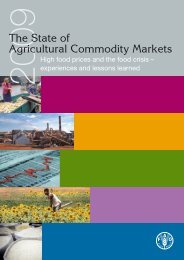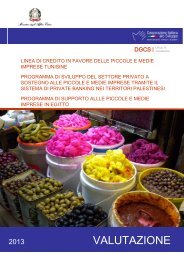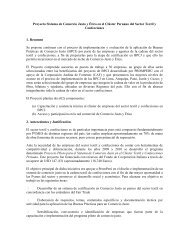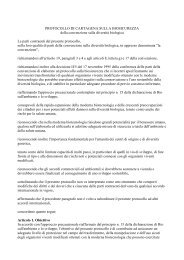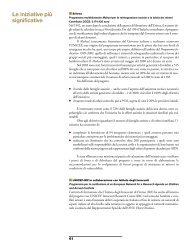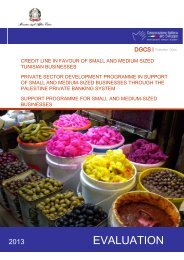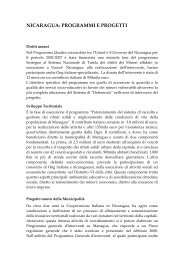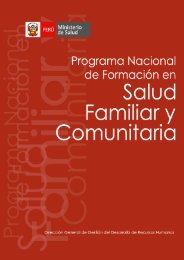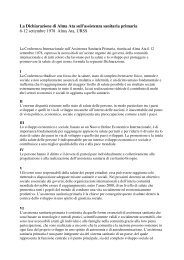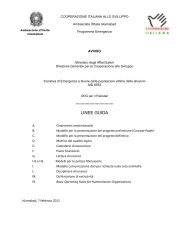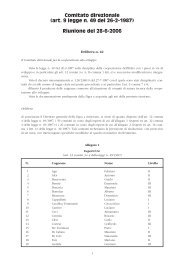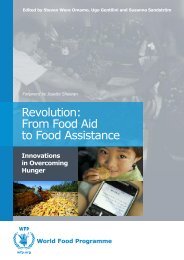here - Cooperazione Italiana allo Sviluppo
here - Cooperazione Italiana allo Sviluppo
here - Cooperazione Italiana allo Sviluppo
You also want an ePaper? Increase the reach of your titles
YUMPU automatically turns print PDFs into web optimized ePapers that Google loves.
T. remains in this house for 21 days and as the wife of the man is in hospital, itis she who takes care of cooking, keeping the house in order and doing theshopping. In the house t<strong>here</strong> is another Nigerian boy who is the baby sitter. In themeantime, T. starts making braids in the food store owned by the person hostingher.When the wife returns home C. tells her that he owns another house w<strong>here</strong> heputs the girls that should depart for Italy, but in her case, from the moment that theperson who is waiting for her in Italy has recommended not to place her with theothers “because she is not one of them”, he proposes that she lives until themoment of departure with his brother in law.T. t<strong>here</strong>fore stays a further 14 days in the home of the brother in law.From the moment that the tourist visa was out of date, she is provided with a“paper” that permits her freedom of movement in the city. Often she goes and doesthe shopping for the girls hidden in the other house. T. describes like this thecondition of these women: “These girls could not speak, they were always closedin a room under the garage, t<strong>here</strong> were many, many ”.The privileged position of T., given to the fact that in a certain way she was“recommended”, but also to the fact that she was a few months pregnant, gave anillusion during the entire journey to be really destined for another type of work. Hervisual angle t<strong>here</strong>fore, due to her condition, is much richer and the information sheprovides is detailed. It is an account of a journey, as we will see, almost unique, notonly for the particularly adventurous contents, but also because few other womenexploited by trafficking could have reconstructed in such detail, since the majorityof them find themselves in a condition of total reclusion and travel heaped incovered wagons.At the end of two weeks, the journey to Italy begins. C. escorts T. to a hotel andhands her over to two “Italians” 26 who drive the covered wagon. They make herjoin them in the cabin, so t<strong>here</strong>fore she is not aware that behind, under thetarpaulin, t<strong>here</strong> are dozens of people hidden. She finds this out towards eveningwhen they arrive in an isolated place and 30 people of Nigerian and Bengalnationality are put down.“They made us descend because they were shouting that they were dying «I amdying, <strong>here</strong> it is hot», they were sick…so they stopped and told us to wait t<strong>here</strong>until someone arrived”.They were stopped for a short while when a man joined them who explainedthat they had to cross the snow covered mountains that they could see ahead. “Theytold us that when we arrive on the other side it is Italy” remembers T. [in realitythey were instead near the border between Hungary and Slovenia, Ed.].The two Italians, who had accompanied them until that point, go back with thewagon and another 4 men of Italian nationality arrive.26T. maintains that she can tell Italians because in Nigeria, since the migration started towards Italy, t<strong>here</strong>were some words diffused in Italian (these were in particular swear words and insults).



